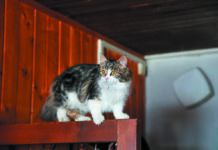Adult cats do not generally meow to each other. Cat-to-cat meows are reserved for kittens who want to say something to their mothers. For instance, they use “talking” to let their mothers know they’re cold or hungry.
Adult cats do meow to people, however. And it’s not just those of the Siamese breed, who are often big-time vocalizers. Any cat may want to speak to her human. Why? Let us count the reasons.
I want attention! Sometimes a cat meows to get you to focus on her. She wants interaction, either in the form of play or just plain petting and stroking.
I don’t feel well! Even though cats are masters at disguising their pain, as a cat matures, she can develop an overactive thyroid or kidney disease, and either of those can result in a fair amount of meowing.
Hello! Does your cat talk to you when you come home after having been out for several hours? If so, she’s greeting you and letting you know she’s happy to see you.
I want to go out! This tends to be a meow for help from cats who have been stray and are transitioning to life indoors. They meow both to be let out and then to be let back in.
I’m disoriented! In some cases senility prompts a cat to meow. Perhaps it’s a kind of distress call. The cat may be uncomfortable that she is not perceiving things as she once did. She feels at a loss.
I’m lonely! Sometimes it’s not you who will hear your cat meowing but your neighbors. If your cat spends a lot of time by herself, she may “talk” about it in distress.
I’m hungry! Many people with cats are familiar with this reason for discourse, which may occur as early as 5 AM!
If the meowing seems excessive
In a number of instances, meowing is an adorable reminder that your cat feels very bonded to you. Who doesn’t like their pet meowing “hello” and rubbing back and forth against them when they walk in the door?
But in some cases, the meowing may occur often enough and persistently enough to interfere with your peace of mind. What do you do then?
First, take your cat to the doctor to make sure nothing is wrong medically. Illness can cause all kinds of discomfort—unusual hunger, thirst, restlessness, or irritability—and that can lead to extra vocalizations. Diagnosing and treating a disease should take away the physical aches and pains that bring on all the vocalizing.
If a medical cause of the meowing is ruled out and the vocalizations are deemed behavioral, approach the issue situationally. Sometimes, the best bet is not to give in to the demands of the sounds. For instance, feed your cat when she is supposed to be fed, not when she insists on it. If she’s waking you early in the morning for her food and you don’t have the patience to train her out of her unwanted “talking” in the pre-dawn hours by standing firm, consider feeding her from an automatic feeder that is set to dispense her kibble at a prescribed time so she separates the idea of being fed from the idea of you doling out the food.
If your cat likes to get your attention for play time and petting by meowing but the vocalizations come at intervals that you feel are too frequent and too disruptive, don’t respond to her verbal supplications. Rather, respond as soon as she stops, even if she stops just to catch her breath. That will teach her that you want to play with her but that excessive meowing will not make it happen.
Also ignore your formerly homeless cat’s meowing when you decide she has had her last foray outdoors but she continues begging to spend time away from the house. Just make sure to replace her outdoor activity with plenty of environmental enrichment in the form of game-playing and toys.
One case in which you might not want to ignore excessive behavioral meowing is if it occurs in your absence. If your pet meows out of loneliness, and if finances will allow, consider hiring a cat sitter to come in during the day to pay attention to her and offer some quality time.




